T-34: Difference between revisions
1d4chan>Rocko1345 (Okay, now I am done with Flames of War pages for a time until I can stomach looking at another wikipedia article to avoid pissing off treadheads for a while) |
m (42 revisions imported) |
||
| (16 intermediate revisions by 10 users not shown) | |||
| Line 1: | Line 1: | ||
{{topquote| | {{topquote|Quantity has a quality of its own.|Joseph Stalin <small>(attributed)</small>}} | ||
{{topquote| | {{topquote|...Soviet tank T34 is a typical example of backwater Bolshevik technology. This tank can't compete with the best models of our tanks, manufactured by loyal sons of the Reich, that has proven their superiority time and again.|Heinz Guderian in his letter to command, October 1941 <small>(ironically, it was protocoled during the meeting at which specifications for [[Panther]] were discussed)</small>}} | ||
{{topquote|Up to this time we had enjoyed tank superiority, but from now on the situation was reversed. The prospect of rapid, decisive victories was fading in consequence. I made a report on this situation, which for us was a new one, and sent it to the Army Group; in this report I described in plain terms the marked superiority of the T34 to our Panzer IV and drew the relevant conclusions as they must affect our future tank production. I concluded by urging that a commission be sent immediately to my sector of the front, and that it consist of representatives of the Army Ordnance Office, the Armaments Ministry, the tank designers and the firms which built the tanks. If this commission were on the spot, it could not only examine the destroyed tanks on the battlefield but could also be advised by the men who had to use them what should be included in the designs for our new tanks. I also requested the rapid production of a heavy anti-tank gun with sufficient penetrating power to knock out the T34.| Also Heinz Guderian, this time in his memoirs}} | |||
[[File:T-34 (Better Image).png|thumb|"We are the armored fist of the red army!"]] | [[File:T-34 (Better Image).png|thumb|"We are the armored fist of the red army!"]] | ||
A legendary [[tank]], and one of the most iconic of the Second World War. The '''T-34''' is the posterchild of the Soviet Union, the glorious tank of the proletariat, and the most versatile platform available to you as a Red Army commander. Cheap, simple, but capable, the T-34 became the most produced tank of the war at 80,000 units and was one of the only tanks to serve all the way through the war from the start of Operation Barbarossa in 1941 to the Victory parade in 1945. In 1943 after the Battle of Kursk the T-34 was up gunned with an 85mm cannon to help it deal with heavier German armor and in this guise it pushed all the way from Leningrad to Berlin. | A legendary [[tank]], and one of the most iconic of the Second World War. The '''T-34''' is the posterchild of the Soviet Union, the glorious tank of the proletariat, and the most versatile platform available to you as a Red Army commander. Cheap, simple, but capable, the T-34 became the most produced tank of the war at 80,000 units and was one of the only tanks to serve all the way through the war from the start of Operation Barbarossa in 1941 to the Victory parade in 1945. In 1943 after the Battle of Kursk the T-34 was up gunned with an 85mm cannon to help it deal with heavier German armor and in this guise it pushed all the way from Leningrad to Berlin. | ||
Produced in enormous numbers and destroyed in equally-vast numbers, the T-34 is the second-most widely-produced tank of all time (second only to its successor, the T-54/T-55), and the most destroyed tank of all time, with over 40,000 T-34's lost on the Eastern Front in World War II. Though completely outclassed by modern armor, the T-34 remains as tough as ever and soldiers stubbornly on into the 21st century with a handful still in active service, and at least one has been seen in action in Yemen. | Produced in enormous numbers and destroyed in equally-vast numbers, the T-34 is the second-most widely-produced tank of all time (second only to its successor, the T-54/T-55), and the most destroyed tank of all time, with over 40,000 T-34's lost on the Eastern Front in World War II. It should be noted that it was also seen as more disposable, and often a moderately damaged and salvagable vehicle would be written off and chopped up for spare parts. Though completely outclassed by modern armor, the T-34 remains as tough as ever and soldiers stubbornly on into the 21st century with a handful still in active service, and at least one has been seen in action in Yemen. | ||
==Flames of War== | ==Flames of War== | ||
In game, the T-34 is a solid medium tank with a few interesting features that make it difficult to play in most situations but also help drive the price down. It is exceptionally mobile with a 2+ cross check and a 12" tactical move, but have a -1 to hit on the move. They have good armor for a medium tank, but are aggressive at best. They only have penetration 9 on the main gun, meaning they struggle against even German medium armor in late war. Fortunately, Late War players have access to the T-34/85, which pretty much resolves all these issues while keeping the strengths of the previous model. When used right, you can drown your opponents in a tide of glorious stalinium. When used clumsily, however, you'll simply waste lives and bring shame to your country. | In game, the T-34 is a solid medium tank with a few interesting features that make it difficult to play in most situations but also help drive the price down. It is exceptionally mobile with a 2+ cross check and a 12" tactical move, but have a -1 to hit on the move. They have good armor for a medium tank, but are aggressive at best. They only have penetration 9 on the main gun, meaning they struggle against even German medium armor in late war. Fortunately, Late War players have access to the T-34/85, which pretty much resolves all these issues while keeping the strengths of the previous model. When used right, you can drown your opponents in a tide of glorious stalinium. When used clumsily, however, you'll simply waste lives and bring shame to your country. | ||
For some pointless pedantry/trivia, the T-34 variants were never actually written as /76 or /85 by the Red Army - this was how then-present German armories designated them. The Russians designated the variants with a dash (T-34-85). | |||
===Mid War=== | ===Mid War=== | ||
| Line 24: | Line 27: | ||
====OT-34==== | ====OT-34==== | ||
[[File:OT-34 | [[File:OT-34.jpg|thumb|left|Da firey stats]] | ||
A specialized variant of the T-34/76 and T-34/85, the OT-34 takes its name from ''Ognemet'', the Russian word for "Flamethrower." A cheerful wartime gift from the USSR to the Nazi invaders, the OT-34 has had its hull-mounted machine gun replaced with an ATO-41 (or later on, ATO-42) flamethrower to allow it to burn Nazis to death as well as shoot them, blow them up, and run them over. While the flamethrower's range is considerably shorter than that of any machine gun (100m or so), it is far more terrifying and extremely lethal. | A specialized variant of the T-34/76 and T-34/85, the OT-34 takes its name from ''Ognemet'', the Russian word for "Flamethrower." A cheerful wartime gift from the USSR to the Nazi invaders, the OT-34 has had its hull-mounted machine gun replaced with an ATO-41 (or later on, ATO-42) flamethrower to allow it to burn Nazis to death as well as shoot them, blow them up, and run them over. While the flamethrower's range is considerably shorter than that of any machine gun (100m or so), it is far more terrifying and extremely lethal. | ||
| Line 32: | Line 35: | ||
====T-34/85==== | ====T-34/85==== | ||
[[File:T-34-85 Stats B.jpg|thumb|left|Now with a bigger boomstick]] | |||
[[File:T-34-85 Stats A.jpg|thumb|left|I need a hero, I'm holding out for at hero 'till the end of the night]] | |||
The T-34/85 is the final evolution of the T-34 tank. It mounts a powerful AT12 fp 3+ cannon in a 3 man turret that gives it the ability to deal with enemy medium tanks far more reliably as well as shoot more accurately on the move. This really unlocks the T-34s full potential as a fast, brutal knife fighting tank that excels at exploiting breakthroughs and flanking enemy positions. | The T-34/85 is the final evolution of the T-34 tank. It mounts a powerful AT12 fp 3+ cannon in a 3 man turret that gives it the ability to deal with enemy medium tanks far more reliably as well as shoot more accurately on the move. This really unlocks the T-34s full potential as a fast, brutal knife fighting tank that excels at exploiting breakthroughs and flanking enemy positions. | ||
| Line 45: | Line 50: | ||
Evaluating the performance of the T-34 is a bit tricky compared to other WW2 tanks because the T-34 was a Russian tank and as such access to Soviet archives has been spotty at best over the years. Following the war the Germans who faced them in battle wanted jobs in NATO helping to fend off the Russian Bear so books written by them have incentives to overplay and 'enhance' the strengths of the T-34 to in part pull blame away from their own failings. | Evaluating the performance of the T-34 is a bit tricky compared to other WW2 tanks because the T-34 was a Russian tank and as such access to Soviet archives has been spotty at best over the years. Following the war the Germans who faced them in battle wanted jobs in NATO helping to fend off the Russian Bear so books written by them have incentives to overplay and 'enhance' the strengths of the T-34 to in part pull blame away from their own failings. | ||
What we can say is that the T-34 was one of the most advanced tank designs in the world when it first hit the battlefield. Incorporating lessons learned from the tank battles at Lake Khasan and Khalkhin Gol, the T-34 had better armor, mobility, and firepower than many of its contemporaries, and was an ''extremely'' rude surprise for the Germans who first encountered it in Operation Barbarossa | What we can say is that the T-34 was one of the most advanced tank designs in the world when it first hit the battlefield. Incorporating lessons learned from the tank battles at Lake Khasan and Khalkhin Gol, the T-34 had better armor, mobility, and firepower than many of its contemporaries, and was an ''extremely'' rude surprise for the Germans who first encountered it in Operation Barbarossa. Banking on their master race technological superiority, the Wehrmacht found that that their ''only'' real advantage against the T-34 was that, while the tank itself was awesome, Russian crews were ''Scheiße''. Poorly trained and inexperienced crews of conscripted peasants all too often didn't know how to take full advantage of the T-34's strengths. | ||
Not to say the T-34 was perfect, though. Issues like poor mechanical reliability to bad steel quality, and a two-man turret, meaning the commander had to also load the gun while also leading, but as the war progressed, some of these issues were ''ironed'' out. Ultimately, the greatest enemy to itself tended to be the low-quality control the factory had due to the general order | Not to say the T-34 was perfect, though. Issues like poor mechanical reliability to bad steel quality, and a two-man turret, meaning the commander had to also load the gun while also leading, but as the war progressed, some of these issues were ''ironed'' out. Ultimately, the greatest enemy to itself tended to be the low-quality control the factory had due to Stalin issuing the general order of "Build them the fuck faster", and since the only thing Stalin loved more then killing his own people was ordering other's to kill his own people, Build them the Fuck Faster they did. Some historians have argued that building more T-34 at the cost of lowering quality instead if building them up to proper standard actually cost soviets more, as tanks come with a huge logistical trail and poorly made tanks consume just as much if not more fuel, lubricants and spare parts, not to mention crew you have to spend time and money to train. There were periods when quality control was so rock-bottom more then 50% of T-34 losses were from non-combat incidents, as things broke down and refused to turn on after few kilometers of moving off-road or even didn't star up right after being loaded off the train - building tanks twice as fast doesn't really pay out if only half of those tanks could reach their first battle in a working condition. The habit of building as many as possible has it's origins in the general high attrition rate of 41-42, in which the Soviets were on the back-foot while the Wehrmacht was at it's comparative strongest. Having something on hand that mostly works beats something better 30km away, that was lost or would arrive a three weeks from now after the Nazis had marched into town you were guarding. | ||
By 1943, with the introduction of heavy German Tiger and Panther tanks (the latter being made in direct response to the T-34) resulted in the outdating of the base T-34. Interestingly, Soviet mechanized infantry were oftentimes just dudes with guns that sat on the top of T-34s, which while efficient, was also an understandably costly method of troop deployment compared to trucks or Half-tracks. | By 1943, with the introduction of heavy German Tiger and Panther tanks (the latter being made in direct response to the T-34) resulted in the outdating of the base T-34. Interestingly, Soviet mechanized infantry were oftentimes just dudes with guns that sat on the top of T-34s, which while efficient, was also an understandably costly method of troop deployment compared to trucks or Half-tracks. | ||
Latest revision as of 08:26, 23 June 2023
"Quantity has a quality of its own."
- – Joseph Stalin (attributed)
"...Soviet tank T34 is a typical example of backwater Bolshevik technology. This tank can't compete with the best models of our tanks, manufactured by loyal sons of the Reich, that has proven their superiority time and again."
- – Heinz Guderian in his letter to command, October 1941 (ironically, it was protocoled during the meeting at which specifications for Panther were discussed)
"Up to this time we had enjoyed tank superiority, but from now on the situation was reversed. The prospect of rapid, decisive victories was fading in consequence. I made a report on this situation, which for us was a new one, and sent it to the Army Group; in this report I described in plain terms the marked superiority of the T34 to our Panzer IV and drew the relevant conclusions as they must affect our future tank production. I concluded by urging that a commission be sent immediately to my sector of the front, and that it consist of representatives of the Army Ordnance Office, the Armaments Ministry, the tank designers and the firms which built the tanks. If this commission were on the spot, it could not only examine the destroyed tanks on the battlefield but could also be advised by the men who had to use them what should be included in the designs for our new tanks. I also requested the rapid production of a heavy anti-tank gun with sufficient penetrating power to knock out the T34."
- – Also Heinz Guderian, this time in his memoirs
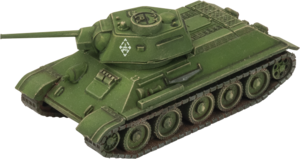
A legendary tank, and one of the most iconic of the Second World War. The T-34 is the posterchild of the Soviet Union, the glorious tank of the proletariat, and the most versatile platform available to you as a Red Army commander. Cheap, simple, but capable, the T-34 became the most produced tank of the war at 80,000 units and was one of the only tanks to serve all the way through the war from the start of Operation Barbarossa in 1941 to the Victory parade in 1945. In 1943 after the Battle of Kursk the T-34 was up gunned with an 85mm cannon to help it deal with heavier German armor and in this guise it pushed all the way from Leningrad to Berlin.
Produced in enormous numbers and destroyed in equally-vast numbers, the T-34 is the second-most widely-produced tank of all time (second only to its successor, the T-54/T-55), and the most destroyed tank of all time, with over 40,000 T-34's lost on the Eastern Front in World War II. It should be noted that it was also seen as more disposable, and often a moderately damaged and salvagable vehicle would be written off and chopped up for spare parts. Though completely outclassed by modern armor, the T-34 remains as tough as ever and soldiers stubbornly on into the 21st century with a handful still in active service, and at least one has been seen in action in Yemen.
Flames of War[edit]
In game, the T-34 is a solid medium tank with a few interesting features that make it difficult to play in most situations but also help drive the price down. It is exceptionally mobile with a 2+ cross check and a 12" tactical move, but have a -1 to hit on the move. They have good armor for a medium tank, but are aggressive at best. They only have penetration 9 on the main gun, meaning they struggle against even German medium armor in late war. Fortunately, Late War players have access to the T-34/85, which pretty much resolves all these issues while keeping the strengths of the previous model. When used right, you can drown your opponents in a tide of glorious stalinium. When used clumsily, however, you'll simply waste lives and bring shame to your country.
For some pointless pedantry/trivia, the T-34 variants were never actually written as /76 or /85 by the Red Army - this was how then-present German armories designated them. The Russians designated the variants with a dash (T-34-85).
Mid War[edit]
T-34/76[edit]
The Mid-War T-34/76 is the best tank anywhere on the Eastern Front, and arguably the best tank anywhere in the world at that time. It comes in two variants, Regular and Hero, affecting crew skill and morale. Axis players will surely enjoy seeing their PaK-36 guns get crushed under its treads after their shells bounce off, and their Panzer II's would be better off starting the game already discarded to save time. The Panzer III is able to do better, but it still fought at a disadvantage. The Soviet Union may have been losing the war by a wide margin in 1941-1942, but the Mid War T-34/76 has no equal.
Late War[edit]
T-34/76[edit]
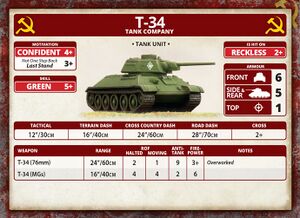
The T-34/76 is an interesting beast in Late War. Just like in Midwar, it comes in 2 flavors: Regular and Hero. Here the T-34 has a lot more predators, with a plethora of AT11+ guns making short work of your front armor of 6 and FA6+ tanks giving your AT9 cannon pause. This makes your tanks exceptionally cheap though at around 3 points per tank. Just make sure to bring something a little heavier to help take care of the heavier enemy tanks.
The Regular T-34s are crewed by illiterate conscripts with a 5+ skill but a last stand of 3+, but they at least have a 3+ to hit, representing lessons learned by the Red Army in the furnaces of Kursk and Stalingrad. These tanks can be taken in companies of 5 to 10; massive Napoleonic blocks of Soviet engineering that are durable for the sheer number of hulls they bring. Roll your tanks up to the enemy, park, and start blasting. Your overworked trait makes it hard to be super lethal on the move, and your low skill makes it hard to use movement orders to overcome this or protect your tanks, but your mobility helps you get into position quickly. Interestingly enough, T-34/85s can be sprinkled in among your regular T-34/76s to help mitigate this, though you'll get a bit better value out of a full T-34/85 company.
The Hero T-34s represent your hardened veterans of some of the most brutal fighting of the war. They lose the 3+ last stand, but have 4+ skill and a 3+ tactics. This, combined with the T-34s 2+ cross and mobility, means that they can better use terrain to help protect their their low numbers. They only come in units of 3 or 4, with the option to switch out up to half their tanks for T-34/85s. These formations are a lot easier to maneuver and use, being a lot more similar to traditional units in other armies.
OT-34[edit]
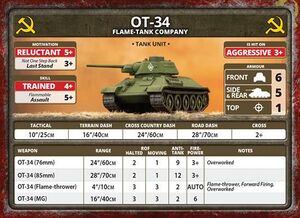
A specialized variant of the T-34/76 and T-34/85, the OT-34 takes its name from Ognemet, the Russian word for "Flamethrower." A cheerful wartime gift from the USSR to the Nazi invaders, the OT-34 has had its hull-mounted machine gun replaced with an ATO-41 (or later on, ATO-42) flamethrower to allow it to burn Nazis to death as well as shoot them, blow them up, and run them over. While the flamethrower's range is considerably shorter than that of any machine gun (100m or so), it is far more terrifying and extremely lethal.
OT-34 tanks were rare (a grand total of less than 1500 were made between the 76 and 85 variants), intended for specialist roles when tough opposition in hardened structures or well-defended buildings needed the cleansing power of working-class flame. Because one of its machine guns has been swapped out and not its main cannon, the OT-34's range is less than a larger, heavier flamethrower could offer, but the OT-34 is also able to fight overall just the same as any other T-34 tank. It just has the bonus ability of getting good and close to help the Fascists out with their struggle against the Russian cold.
Because only the hull-mounted machine gun is replaced, most any 15mm-scale T-34 could be designated as an OT-34 for gameplay purposes, but for complete accuracy, a different model is required, distinguished by the wider barrel of its flamethrower.
T-34/85[edit]
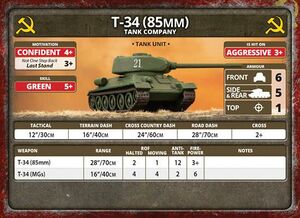
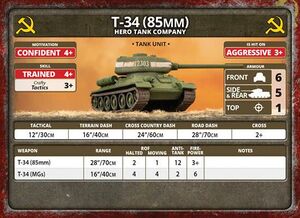
The T-34/85 is the final evolution of the T-34 tank. It mounts a powerful AT12 fp 3+ cannon in a 3 man turret that gives it the ability to deal with enemy medium tanks far more reliably as well as shoot more accurately on the move. This really unlocks the T-34s full potential as a fast, brutal knife fighting tank that excels at exploiting breakthroughs and flanking enemy positions.
The Regular T-34/85 tank company suffers from the same poor skill and survivability as its weaker T-34/76 equivalent, but maintains the same mobility and improves greatly on the firepower. The 3 man turret and improved firepower combined with that mobility give you great alpha strike potential. Help mitigate your casualties by blocking enemy line of sight with terrain, then pushing up and hitting with everything you have.
The Hero T-34/85 tank company benefits from the same exceptional tactics and improved skill as their T-34/76 cousins. Use the skill to help increase your alpha strike ability and use your smaller companies to take advantage of cover and concealment. Maneuver is key here, you need to mass your tanks against the enemy and deal as much damage as possible up front that your enemy won't have a good chance to recover his footing. This will protect your relatively small numbers of tanks from enemy fire and help your tanks hit well above their weight.
Bolt Action[edit]
The T-34 appears in its 76 and 85 variants in Bolt Action, the main difference with Flames of War being that armor and infantry forces are both fielded much more at the platoon level, versus the often company-scale forces players send in with Flames of War.
IRL[edit]
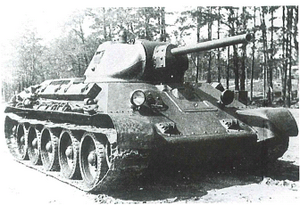
Evaluating the performance of the T-34 is a bit tricky compared to other WW2 tanks because the T-34 was a Russian tank and as such access to Soviet archives has been spotty at best over the years. Following the war the Germans who faced them in battle wanted jobs in NATO helping to fend off the Russian Bear so books written by them have incentives to overplay and 'enhance' the strengths of the T-34 to in part pull blame away from their own failings.
What we can say is that the T-34 was one of the most advanced tank designs in the world when it first hit the battlefield. Incorporating lessons learned from the tank battles at Lake Khasan and Khalkhin Gol, the T-34 had better armor, mobility, and firepower than many of its contemporaries, and was an extremely rude surprise for the Germans who first encountered it in Operation Barbarossa. Banking on their master race technological superiority, the Wehrmacht found that that their only real advantage against the T-34 was that, while the tank itself was awesome, Russian crews were Scheiße. Poorly trained and inexperienced crews of conscripted peasants all too often didn't know how to take full advantage of the T-34's strengths.
Not to say the T-34 was perfect, though. Issues like poor mechanical reliability to bad steel quality, and a two-man turret, meaning the commander had to also load the gun while also leading, but as the war progressed, some of these issues were ironed out. Ultimately, the greatest enemy to itself tended to be the low-quality control the factory had due to Stalin issuing the general order of "Build them the fuck faster", and since the only thing Stalin loved more then killing his own people was ordering other's to kill his own people, Build them the Fuck Faster they did. Some historians have argued that building more T-34 at the cost of lowering quality instead if building them up to proper standard actually cost soviets more, as tanks come with a huge logistical trail and poorly made tanks consume just as much if not more fuel, lubricants and spare parts, not to mention crew you have to spend time and money to train. There were periods when quality control was so rock-bottom more then 50% of T-34 losses were from non-combat incidents, as things broke down and refused to turn on after few kilometers of moving off-road or even didn't star up right after being loaded off the train - building tanks twice as fast doesn't really pay out if only half of those tanks could reach their first battle in a working condition. The habit of building as many as possible has it's origins in the general high attrition rate of 41-42, in which the Soviets were on the back-foot while the Wehrmacht was at it's comparative strongest. Having something on hand that mostly works beats something better 30km away, that was lost or would arrive a three weeks from now after the Nazis had marched into town you were guarding.
By 1943, with the introduction of heavy German Tiger and Panther tanks (the latter being made in direct response to the T-34) resulted in the outdating of the base T-34. Interestingly, Soviet mechanized infantry were oftentimes just dudes with guns that sat on the top of T-34s, which while efficient, was also an understandably costly method of troop deployment compared to trucks or Half-tracks.
After sobering up from designing the KV-2, they up-gunned the T-34s with a new turret and 85mm gun, dubbed the T-34-85. This variant was capable of penetrating the Tiger and Panther tanks at reasonable distances, and the addition of a third crew member in the turret finally allowed the commander to do his job efficiently. While still not a one-on-one match to the newer German designs, the T-34-85 was far more cost-effective, with production figures of 1200 tanks per month, compared to the total production of 6557 Panthers, and so Soviet tanks would routinely enjoy numerical superiority in battle.
After the war, T-34s were sold or given to many friendly powers around the world, from China and North Korea in the Korean War, to the MPLA during the Angolan Civil War. Virtually every Warsaw Pact member used the T-34 at first, including Poland and East Germany. Most were refurbished with new engines, tracks, and additional equipment, and some militaries like North Korea and Vietnam still have them in service.
| Soviet Forces in Flames of War | |
|---|---|
| Tanks: | T-70 - Valentine - M5/M3 Stuart - M3 Lee - T-34 - KV - Churchill - IS-2 - Captured Tank Platoon - T-28 - BT-7 - KV-2 - T-26 |
| Transports: | M3 Scout Car - Universal Carrier - SdKfz 251 |
| Infantry: | Rifles - Motor Rifles - Penal Company - Storm Group - SMG Company - Engineer Sapper Company |
| Artillery: | Katyusha - 152mm Artillery - 122mm Artillery - 76mm Artillery - 120mm Mortars - 82mm mortars |
| Tank Destroyers and Assault Guns: | 45mm Anti Tank - 57mm Anti Tank - 76mm Anti Tank - 100mm Anti Tank - SU-76 - SU-85 - SU-100 - SU-122 - SU-152 - ISU-122/ISU-152 |
| Recon: | Scout Platoon - BA-64 Platoon - Armored Reconnaissance Platoon - Reconnaissance Platoon |
| Aircraft: | Il-2 Sturmovik |
| Anti-Aircraft: | ZSU M17 - DShK AA MG Platoon |
| Midwar Monsters: | KV-3 - KV-5 - T-43 |